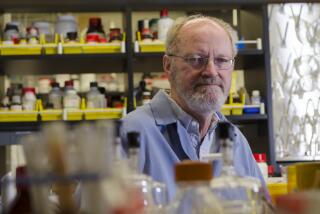Charles Pedersen; Won Chemistry Nobel
- Share via
SALEM, N.J. — Charles J. Pedersen, co-winner of the 1987 Nobel Prize in chemistry for his discovery of molecules that enable scientists to create complex organic compounds, died Thursday after a lengthy illness. He was 85.
Pedersen, a widower who lived alone, died in his Salem home, said Justin Carisio, a spokesman for Pedersen’s former employer, E. I. du Pont de Nemours & Co. He had suffered from a form of blood cancer and Parkinson’s disease, Carisio said.
Pedersen was awarded the Nobel Prize in October, 1987, sharing the $360,000 award with UCLA Prof. Donald J. Cram and French scientist Jean-Marie Lehn for their work in the syntheses of crown ether molecules.
Pedersen, then 83, was the third-oldest person ever to win a Nobel. He was cited for discovering nearly 25 years earlier that a key synthetic compound called a crown ether will bind with metals. That discovery made it possible to synthesize numerous complex organic compounds that imitate the behavior of natural proteins.
Scientists have said crown ethers could lead to the development of radioactivity antidotes, new pharmaceutical delivery systems and extractors of gold and uranium from the sea.
“He was a brilliant chemist and an extraordinary gentleman,” Du Pont Chairman Edgar S. Woolard Jr. said in a statement. “After winning the prize, he inspired everyone else with his dignity, his humility and his personal charm.”
In an interview after receiving the prize, Pedersen said, “I was very excited. That’s all I can remember about how I felt.”
Pedersen was one of the few Nobel winners in the sciences who had never earned a doctorate or a professorship. His highest academic degree was a master’s from the Massachusetts Institute of Technology.
A self-described “hands-on” industrial chemist, Pedersen spent his 42-year career at Du Pont in New Jersey and Delaware, where his research yielded 65 patents, mostly in petrochemicals.
Early in his career, he contributed to the development of Neoprene, the first commercially successful synthetic rubber.
Pedersen was born in Korea of a Norwegian father and a Japanese mother. His father was a seaman who shipped out to what is now North Korea, where he became a mechanical engineer for a gold-mining operation. His mother had immigrated to North Korea to trade in silkworms. The couple met and married in North Korea and their son came to the United States when he was 17.
Pedersen began working for Du Pont in 1927 and some years later transferred to the company’s laboratory in Wilmington, Del., where he remained until his retirement in 1969.






